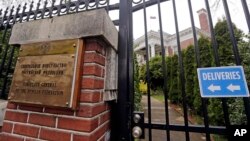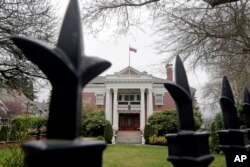The Trump administration's decision to shutter the Russian consulate in Seattle displeased many Russian immigrants Monday, some of whom rushed to its offices in hopes of securing passports, visas and other important documents.
One woman, who identified herself as a dual U.S.-Russian citizen from Boise, Idaho, said she spent $1,000 traveling to Seattle to renew a passport so that she could visit her brother in Russia - only to be turned away. Another, Luda Rieve, of San Diego, told The Seattle Times she too was turned away after taking the day off work and flying from California to renew her passport.
Many procedures handled by the consulate require in-person appearances, and because the administration also ordered the San Francisco consulate closed last September, the only facilities remaining are in New York, Houston and Washington, D.C.
"My sister is at the consulate right now trying to get a travel passport,'' David Mordekhov said, a Seattle lawyer and Moscow native who moved to the U.S. 20 years ago. "Any travel paperwork that has to do with trips to Russia, visa applications, powers of attorney and any other documents are going to be much harder to procure.''
The closure of the Seattle consulate, effective April 2, came as the United States and more than a dozen European nations kicked out Russian diplomats as punishment for Moscow's alleged poisoning of an ex-spy in Britain. The Seattle consulate was responsible for handling requests from people in Alaska, Idaho, Iowa, Minnesota, Montana, Nebraska, North Dakota, South Dakota, Washington, Wisconsin and Wyoming.
The administration cited the consulate's proximity to a submarine base, Naval Base Kitsap, as well as Boeing's operations, but University of Washington international relations professor Don Hellmann suggested that rationale "might be a little simplistic.''
"The real thrust of intelligence these days is digital,'' he said. "It's intellectual property. We live in a hacked world. Microsoft is probably as much a target as the naval base or Boeing.''
The Seattle area is home to about 33,000 Russians, a number of whom work in the engineering or tech industries. Among them is Sergey Bobkov, an analyst for the travel website Expedia, who said Russians and Russian-Americans would to have to travel farther and go through more hoops to visit friends and family there.
"It's been frustrating to no end, to say the least,'' Bobkov said, a 34-year-old native of St. Petersburg, Russia, who holds dual citizenship. "I'm trying to get a visa for my wife to go to Russia with me in August. We will have to either fly to New York City or Washington, D.C. and handle those things in person, or we'll have to pay someone under the table to do express services.''
He added, "It's hard on all of us who have nothing to do with politics.''
Not everyone who showed up Monday came away empty-handed. Alex Bendetov said he was able to obtain a passport for his baby after starting the process some time ago.
"My wife acted quickly. She said, 'We gotta go and try to pick up the passport,''' he said. "We have grandparents living back home and it's important to go back and visit with them.''
Last summer, the Trump administration ordered the San Francisco consulate closed in a diplomatic tit-for-tat, after Congress passed sanctions against Russia for election interference and the Kremlin retaliated by ordering the U.S. to cut its diplomatic staff there. A day later, black smoke poured from a chimney as consular officials burned undisclosed items in a fireplace, prompting a response from firefighters.
There were no immediate reports of smoke Monday at the consulate's offices on the 25th floor of a downtown Seattle skyscraper or at the consular residence, a stately red-brick building surrounded by a wrought-iron fence, cedar trees and rhododendrons.





